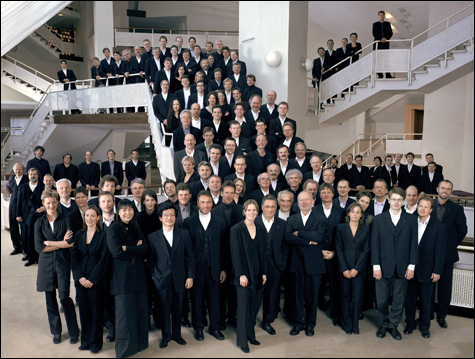
THE WORLD’S GREATEST ORCHESTRA? You’d be hard-pressed to find a better one. |
When what’s arguably the world’s best symphony orchestra, with one of the world’s leading conductors, comes to town to play one of the monuments of Romantic early-20th-century music, with two of the world’s finest singers, expectations run high. It would be too much to say that the Celebrity Series-sponsored performance of Gustav Mahler’s Das Lied von der Erde (“The Song of the Earth”) that Simon Rattle and the Berlin Philharmonic Orchestra brought to Symphony Hall Monday night, with Canadian tenor Ben Heppner and German baritone Thomas Quasthoff, was a disappointment. I can’t recall hearing a live Lied that was this good. But Mahler’s song cycle about taking leave of the Earth has to be a life-and-death experience, and this wasn’t.
Heppner and Quasthoff have sung the piece together in Symphony Hall before, in October 1998 with the Boston Symphony Orchestra, and before that Heppner had sung it here in November 1994 with Anne Sofie von Otter and the BSO under then guest conductor James Levine (who will be doing the piece with Otter and Johan Botha and the BSO in April). Leaning forward, and holding a pocket version of the score in his right hand, as if embarrassed to admit he knew his three songs — the odd-numbered ones, “Das Trinklied vom Jammer der Erde” (“The Drinking Song of the Earth’s Sorrow”), “Von der Jugend” (“Of Youth”), and “Der Trunkene im Frühling” (“The Drunkard in Spring”) — by heart, Heppner was more authoritative than I remember his being in ’98. He had to fight the orchestra, as almost every tenor does in this work, and there were times when Rattle could have done more to help. Against that, Rattle made room for feeling in what many conductors treat as pure extroversion, the tenor as blustery alcoholic. Heppner was a sobered, reflective alcoholic, caressing his “Dunkel ist das Leben, ist der Tod” (“Dark is life, is death”) refrains in “Trinklied,” pausing wistfully before “Ein voller Becher Weins” (“A full goblet of wine”), celebrating the blooming of the Earth in spring. The reflection was physical in the water’s mirror image in “Von der Jugend,” and he made it palpable. When in “Der Trunkene im Frühling” he discovered that spring had arrived, awe colored his voice, and when he raged at the black firmament, he made you recall how back in the “Trinklied” the firmament was eternally blue. The tenor’s last line is “Laßt mich betrunken sein!”; Heppner rolled the “r,” as if to ask what choice the world had given him.

Quasthoff, in my recollection the hero of that 1998 evening, seemed a little detached Monday, and perhaps not in his happiest voice. He sounded most comfortable at the beginning of “Der Abschied” (“The Farewell”), Mahler’s stupendous conclusion, at a half-hour almost as long as the first five songs put together: the orchestra was preternaturally hushed, and it was if he were setting his own tempo, a slow one, and controlling it. There were other sublimities: “Spiegelt sie im blanken Wasser wider” (“Mirrors itself in the bright water”) in “Von der Schönheit” (“Of Beauty”); the silver tone of his “Silberbarke” (“silver boat”) in “Der Abschied,” and the evening chill of “Es wehet kühl” (“It is cool”), and best of all the glimpse of eternity at the end in “Allüberall und ewig blauen licht die Fernen” (“Everywhere and forever the beyond gleams blue”). But in some of the most poignant moments — the “Mein Herz ist mude” (“My heart is weary”) of “Der Einsame im Herbst” (“The Lonely One in Autumn”), the image of the girl whose heart follows the youth who’s just ridden by that concludes “Von der Schönheit” — he didn’t sound settled, and in places — the racing-steed section of “Von der Schönheit,” the “O Schönheit! O ewigen Liebens” outburst of “Der Abschied” — he was overwhelmed by the orchestra. His voice doesn’t have the cutting edge or the dark gravel of a Dietrich Fischer-Dieskau; it almost seems better suited to piano accompaniment. Too, he hadn’t sung this piece with Rattle before, and they didn’t begin rehearsals till shortly before the start of the current American tour (which took them to Carnegie Hall, to do Mahler’s Ninth and Tenth as well as Das Lied, before they came to Boston).